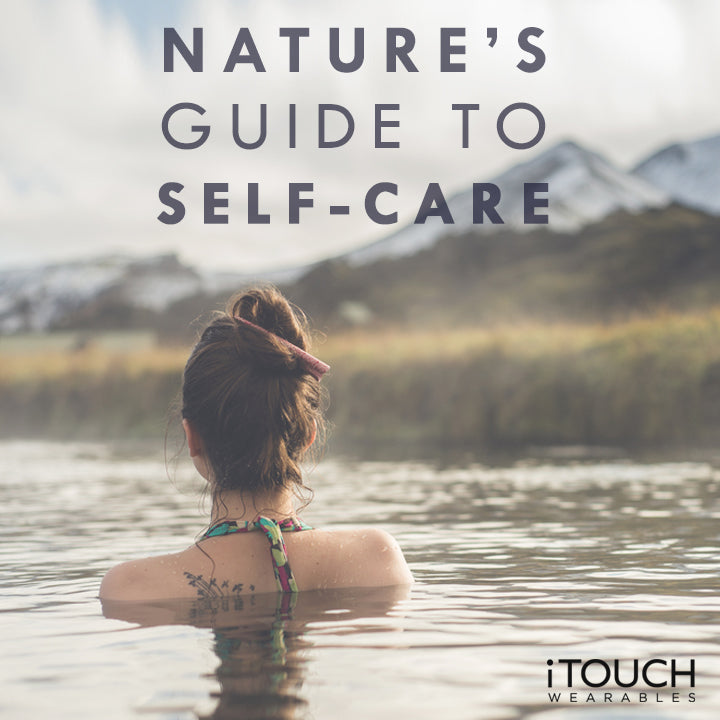
Nature's Guide To Self-Care
When it comes to your mental health and physical health, it is certainly important to practice self-care and show yourself a little love. With this being said, everyone has their own routine when it comes to their self-care. However, with spring and summer just around the corner, why not explore just exactly what nature and the outdoors can do for you! We all know that wandering in nature can provide an endless amount of benefits to your own well-being, there are many different activities and things that nature can provide to help lower your cortisol levels, manage your blood pressure levels, and even improve memory. If you are curious what more nature can do, here is our nature's guide to self-care:
Nature Walk

Let's start of easy shall we? When it comes to being outdoors, nature walks can be an essential tool to one's own self-care. Nature walks aren't about building your speed or working on your endurance, but rather about practicing mindfulness and taking a moment for shifting your attention to the beauty of the nature around you. Within your walk, you can focus on the colors around you, being in-tune to the smells of the flowers and herbs that grow or the sounds of the birds or animals living off the path. There is a practice known as Japanese Tree Bathing or Shinrin-Yoku in which the deeper you go into the woods, the more benefits you may find when being within nature. These "forest-baths" are known to promote lower concentrations of cortisol, lower pulse rate, lower blood pressure, greater parasympathetic nerve activity, and lower sympathetic nerve activity according to a study done by the Center for Environment, Health and Field Sciences at Chiba University. Consider finding a trail or hike near you where you can take some time to explore what nature can do for you.
Foraging

Foraging is an activity that mostly anyone can do under the right circumstances. What is so great about foraging is that not only does it combine elements of a nature walk or Shinrin-Yoku with an outdoor exercise, but also foraging for food contains numerous benefits that are all important to your health. Many wild foods that are foraged are full of more nutrients and phytochemical than cultivated foods, as their soils are not depleted, they can grow properly, and represent a spectrum of eating a varied diet. These phytochemicals and nutrients are said to play a part in almost every role of the cell cycle, and there are numerous new studies that are coming out that saying how they are important for optimal health. When it comes to cultivating and foraging for food, be sure to find a knowledgeable guide to help you on your journey. You want to be sure you do not forage something that turns out to be poisonous or dangerous to your health.
Herbal Tonics

Herbal tonics have existed for a millennia, being predominately found within Eastern medicine. But for over 3,000 of years, the Chinese have utilized herbs to create preventive medicines for reversing diseases, Native Americans have used herbs to produce tonics and have used Ayurvedic medicine for healing rituals and more. The Ancient Greeks and Romans were also powerful herbalists that spread their herb knowledge to other cultures during their travels. When it comes to herbal tonics, there are numerous benefits that come from each herb themselves, but many tonic supplements are used to balance the body. They often provide chemical compounds that help in restoring and nourishing specific organ systems that can create a healthy and long life. Here are some of our favorite herbal tonics to try out:
Herbal Cleansing Tea - For Cold-and-Flu
Serves - About 4 Cups | From Bon Appetit
Gather Together :
-
1 2" Cinnamon Stick
-
1/4 Cup of Coriander Seeds
-
1 Bunch of Cilantro with Roots - Bruised Lightly With Side of a Knife
-
1 Bunch of Rosemary - Bruised Lightly With Side of a Knife
-
1 2" Piece of Peeled Ginger - Finely Grated
-
2 Bags of Detox Tea (such as Traditional Medicinals EveryDay Detox)
-
1 Tablespoon of Honey - Preferably Raw or Manuka Honey
-
1 Tablespoon of Raw Unfiltered Apple Cider Vinegar
Directions :
- Toast cinnamon stick and coriander seeds in a dry small skillet over medium heat, tossing occasionally, until fragrant and beginning to crackle, about 4 minutes (go easy, you don't want to burn them). Crush on a cutting board with the side of a chef’s knife or cleaver (or use mortar and pestle). Transfer to a large saucepan and add 4 cups water. Cook over medium-high heat until an instant-read thermometer registers 100°.
- Add cilantro, rosemary, ginger, tea bags, honey, and vinegar to saucepan, stirring to dissolve honey. Reduce heat to low and let mixture steep until flavorful, 10–15 minutes. Strain through a fine-mesh sieve into a quart jar or large heatproof glass measuring cup, using a ladle to extract as much liquid as possible.
The "Green Machine"
Serves 2 | From Bon Appetit
Gather Together :
-
2 Granny Smith Apples - Halved, Cored, and Finely Chopped
-
1 3'-piece-English Hothouse Cucumber - Finely Chopped
-
1 Cup Fresh Spinach - Packed
-
3/4 Cup of Brewed Green Tea - Room Temperature
-
1/4 Cup of Fresh Mint Leaves
-
2 Tablespoons Honey
-
Fresh Lemon Juice
Directions :
- Purée apples, cucumber, spinach, tea, 1/4 cup mint leaves, and honey in a blender until very smooth. Strain juice through a fine-mesh sieve into a medium pitcher. Season to taste with lemon juice. Divide juice between glasses. Garnish each with a mint sprig.
Hot Springs

If you live somewhere near a hot springs, take full advantage of what they have to offer. The healing powers of hot springs have been used for thousands of years, especially in Europe and Japan - known for their natural treatment options. Hot springs are reputable for having a numerous amount of therapeutic benefits, with many studies having been done that suggest the many different treatments that come from balneology - treatment of disease by bathing. With hot springs, you will find that they overall can help in improving blood circulation by increasing the overall oxygen flow in our bodies, reduce stress and promote sleep, relieve pain, and even heal skin problems. Many people have found that hot springs can smooth and soften dry skin, while the sulphur properties found in the water can be beneficial for those with eczema and psoriasis.
When it comes to any of these practices, always consult a medical practitioner before consuming any herbs or performing any of these activities. Share with us your favorite herbal remedies by following us on Instagram @itouchwearables and Facebook @itouchwearables and by dropping a comment and like. Also, be sure to check out our new articles published daily!
-Patrick


